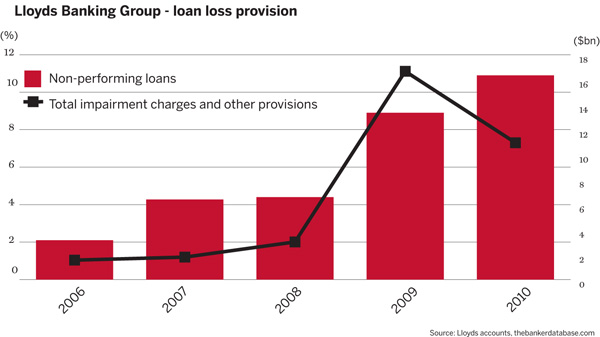Lloyds Banking Group has revealed its provisions and impairments for bad loans have increased 8% from the first quarter in 2010 to £2.608bn ($4.305bn) for the same period in 2011. This is excluding the £3.2bn one-off cost of compensation to customers who were mis-sold payment protection insurance (PPI).
This comes after a year in which the bank reduced its provisions and impairments significantly, from £16.67bn in 2009 to £10.95bn in 2010 (see chart). That reduction implied that the bank thought that non-performing loans (NPLs) had already peaked.
Aside from the PPI debacle, the bank’s exposure to Ireland has been the main reason why the optimism at Lloyds has dissipated. According to the bank’s first quarter report, new provisions and impairments on its Irish exposure have increased from £699m in Q1 2010 to £1.14bn in Q1 2011.
Even with the new impairment charges, provisions will only cover 56% of total non-performing loans on the bank's Irish portfolio. For the rest, the bank is relying on realising loan collateral, much of which is commercial real estate. But valuations are already down heavily in the wake of the financial crisis, and buyers are scarce.
Exposure to Irish loans is classed as part of the bank’s ‘non-core’ assets, that is, activities that Lloyds wants to offload under its restructuring plan. However, the bank may struggle to find investors for distressed Irish commercial real estate, 45% of which is still in the development phase, needing further investment before it can even begin to generate cash. The NPL rate on this Irish property development portfolio was a staggering 94% at end-2010. If the bank is forced to sell its Irish assets at discounts of more than 56%, then further losses could still be in the pipeline.



